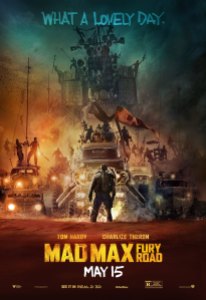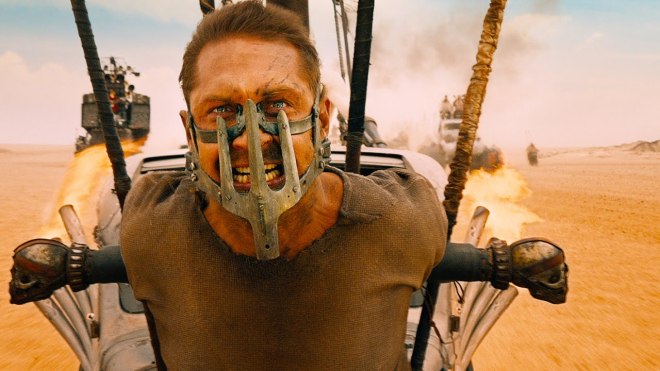 “Mad Max: Fury Road” is insane. It is batshit crazy. In a blockbuster age when CGI superheroes battle untold hoards of robots, monsters and aliens in a chaotic blur, there are just about no modern action movies that are purely mad.
“Mad Max: Fury Road” is insane. It is batshit crazy. In a blockbuster age when CGI superheroes battle untold hoards of robots, monsters and aliens in a chaotic blur, there are just about no modern action movies that are purely mad.
George Miller’s movie is a disturbed fever dream, addled and excitable to the point of delirium. The images, the stunts, the stark blue and orange colorings and the constant, accelerated sensation of being pursued scream that this is an action movie for a future generation. Like the endless car chase that consumes the heroes and villains of Miller’s bleak, post-apocalyptic world, “Fury Road” is so far ahead of every contemporary action movie today just waiting for everyone to catch up.
“Fury Road” itself moves at a faster pace. At times Miller seems to be playing with the frame rate to send his characters into a frenzy and make the chase seem ever more pressing. The shaved and ash-painted War Boys spray chrome over their mouths and feel a rush of adrenaline. Our anti-hero Max (Tom Hardy) is twitchy, nervous and paranoid but always intense. And John Seale’s cinematography zooms, slows and tracks like someone is playing with the remote.
This is a movie always in motion, and that movement is the core of “Fury Road’s” story. When we’re first introduced to Max (Tom Hardy) he smashes a scurrying two-headed lizard and promptly inhales it before being captured by raiding warriors. They imprison him in a massive skull temple carved into the face of a desert cliff, where workers toil below and go mad for momentary floods of water. The man turning the faucet is Immortan Joe (Hugh Keays-Byrne), a warlord more machine than man. His pale body and warts are covered by demonic body armor and his crossbones respirator gives him a dangerous vibe not unlike that of Darth Vader.
Joe sends his greatest general Imperator Furiosa (Charlize Theron) out on a convoy to raid Gasoline Town, only to realize that she has smuggled out Joe’s breeding wives, a half-dozen pristine beauties in scantily clad white garments. Their presence in the film is so radically unexpected from the ruin on all the denizen’s faces. Furiosa herself is shaved bald with a prosthetic arm and a fierce demeanor. Max eventually breaks free from the hunting party looking for Furiosa, and in a survival attempt ends up working together with her to reach salvation in “the Green Place.”
Max shares the film’s namesake, mainly because Miller’s film is an extension, or a 30 year late sequel, to the ‘80s Mad Max trilogy starring Mel Gibson. But as a hero he’s deeply untrusting, impenetrable and a loner. Theron and her company of girls (including Rosie Huntington-Whiteley, Zoe Kravitz and more) end up becoming “Fury Road’s” champions. The women all stand out, get the best lines, kick the most ass and feel the most pain. They’re the human entry point amid the madness.
But “Fury Road” is nothing if not bananas. The film’s car chase consumes nearly the whole movie, and yet it never gets stale. It takes us through an otherworldly sandstorm that spawns a great red spiral of thunder, lightning and chaos. As one of the film’s War Boys, Nux (Nicholas Hoult), enters the storm, he shouts “Fury Road’s” scarily ironic tagline: “What a lovely day!”

So much of the film though is accomplished largely without CGI, and the resulting explosions, the animalistic, vehicular muscle and carnage on display, and the terrifying stunts are all real examples of Miller’s crazed vision of the future. We see a clan of motorcycle warriors leaping over gorges and hurling bombs down at the convoy. We see men grasping onto giant, flexible poles that extend out, place an explosive and whiplash back into place. And this is a movie where for no particular reason a soldier rides on a truck bed suspended by bungee cords and thunders out heavy metal on a flaming guitar. It is an image so incredible and needlessly awesome that movies without it are instantly lesser as a result.
The original “Road Warrior” film (actually the second in the trilogy) instantly became a cult classic. It was weird, apocalyptic and was a new kind of action movie in a wave of gun-toting, macho war movies all concerned with Vietnam. It was from Australia and may as well have been from another world.
“Fury Road” on the other hand is everything contemporary action movies are and so much more. It is purely focused on spectacle over story but doesn’t forget the cinematics that make it unforgettable. It’s crazy and unrealistic as so many are, but it takes everything over the top and outdoes them all. “Fury Road” is the best action movie in a decade because it has the vision, the style and the courage to be truly mad.
4 stars
